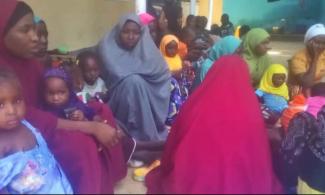
Parents of some of the rescued Chibok secondary school girls abducted by Boko Haram terrorists in Borno State, northeast Nigeria have expressed heartbreak as their rescued daughters have chosen to abandon their families and remain with their insurgent husbands.
In a BBC report, the parents also expressed unhappiness with Governor Babagana Umaru Zulum’s administration for offering support to the rescued girls to remain with the terrorists they got married to while in captivity.
"I am not happy with what the governor did. The girls managed to come out of the forest and the governor married them off again. Her mother is very angry," BBC quoted one of the parents, Yama Bullum as saying.
Bullum’s 29-year-old daughter, Yama is one of 20 Chibok girls rescued over the last two years from Boko Haram hideouts in Sambisa Forest.
Jinkai Yama was one of 276 girls kidnapped from the secondary school on 14 April 2014 by Boko Haram terrorists.
But BBC reports that 10 years after the incident, though Bullum's daughter has been rescued by the Nigerian Army, he still feels as if he has lost his daughter again as has vehemently refused to unite with her parents but to remain with her Boko Haram fighter husband who she married while in captivity.
Bullum and his family currently live in Maiduguri, Borno's capital, in housing organised by Governor Zulum.
Bullum told the BBC that he had assumed his daughter was with other freed Chibok captives and her three children in a special welfare programme provided by the state government, but found out when his daughter called him in August 2023 and handed over the phone to her husband asking him to talk to her husband, the former insurgent.
Bullum, like other parents whose daughters have been rescued, is disturbed by what seems to be the government's approval of marriages between their rescued daughters and the terrorists who abducted them.
The parents perceive Governor Zulum allowing their freed daughters to live with their former captors as wives as sacrificing their daughters in the quest for stability in the region.
According to the BBC report, the heartbroken parents see their daughters’ marriages to the terrorists as a way to appease the “repentant” insurgents.
The parents have also become outraged, especially the Christians, with the fact that while most of them are Christians, their daughters have converted to Islam.
The chairman of the Chibok parents' association, Yakubu Nkeki was quoted as saying, "Some people in Chibok are saying: 'How is it possible that after the rescue of the girls they are still remaining in the Muslim faith?'"
But the rescued girls have on their own chosen to remain with their husbands at Hajj Camp in Bulumkutu which is the main rehabilitation camp for former Boko Haram fighters and their long-term captives.
They are always taken directly to the camp after their rescue or voluntary surrender.
Yama has become estranged from her family to the extent that whenever her parents try to contact her, her husband answers her phone instead.
The BBC also reports that Yama has refused to respond to questions about the situation, saying that her relationship with her parents is no one else's business.
She also expressed how happy she is, noting that her abduction by the terrorists led to her finding what she described as the "true religion".
Her father said, "She doesn't want to have anything to do with us at all."
Another rescued girl, Aisha Graema, reportedly said that she would not have left the forest if she could not be with her Boko Haram fighter husband she married two years after being abducted from the Chibok school.
She said, "We have been married for eight years," said the mother of three. “I first came out of the forest and then he followed me. There in the bush, we had no relatives, no brother, no sister, that is why we decided to come out.
"He finished deradicalisation before we were allowed to stay together. The government welcomed us well, gave us food, shelter, everything."
Also, Mary Dauda, explained that she would not have been able to escape from Sambisa Forest without her husband, who helped her sneak away from the terrorists’ hideout.
The 27-year-old woman said, "We had agreed that he would join me afterwards and present himself to the governor for rehabilitation."
With the outrage from the parents and the rescued girls’ insistence on remaining with their husbands, the state government seems to be in a dilemma of respecting the girls' wishes while fulfilling the desires of their parents by forcing the girls into uniting with their parents.
Governor Zulum was quoted as saying, "My only interest is that we don't want these girls to go back to the bush again.
"Even before they came out [of the Sambisa Forest], some of them gave us conditions - that they will not come without their husbands."
The Borno State Commissioner for Women Affairs and Social Development, Zuwaira Gambo, insists the women were in no way coerced into staying with their spouses.
Gambo said, "They are the ones that insisted that without their husbands, they will not stay in Maiduguri.
"I asked them: 'How can you want to stay with this man who destroyed your life?' and they told me: 'You will not understand.'"
Gambo said that rather than have the couples return to the forest, the authorities sought a different path.
The 20 women - along with 31 children - were moved to a secure facility in an affluent area of Maiduguri. Seven are with their Boko Haram husbands; some of the others are engaged with former fighters they met while in Bulumkutu.